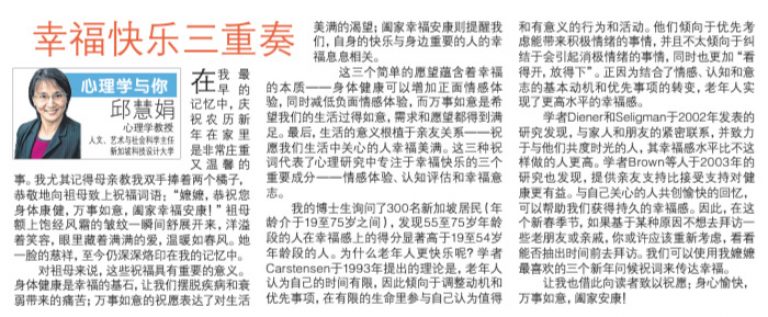The three elements to happiness
Shin Min Daily News, 17 Feb 2024, The three elements to happiness (translation)

In my earliest memories, celebrating the Chinese New Year at home was a very solemn and cosy affair. I especially remember my mother teaching me to hold two oranges in both hands and respectfully wish my grandmother: “Ma Ma, I wish you good health, success, and happiness and health for the family!” The weather-beaten wrinkles on my grandmother’s forehead straightened out in an instant, and she was filled with a smile. Her eyes were full of love, as warm as the spring breeze. The kindness on her face is still deeply imprinted in my memory.
To my grandmother, these blessings held great significance. Good health is the cornerstone of happiness, freeing us from the pain caused by disease and infirmity; wishes for success express our desire for a happy life; happiness and health for the whole family reminds us that our own happiness is closely related to the happiness of the important people around us.
These three simple wishes contain the essence of happiness – good health can increase positive emotional experiences while reducing negative emotional experiences, and success is the hope that our lives will go well and that our needs and desires will be met. Ultimately, the meaning of life is rooted in relationships with family and friends – wishing happiness and fulfillment in the lives of the people we care for. These three types of greetings represent the three important components that focus on happiness in psychological research—emotional experience, cognitive evaluation, and the determination to be happy.
My PhD student surveyed 300 Singapore residents (aged between 19 and 75 years old) and found that those in the 55 to 75 age group scored significantly higher on happiness than those in the 19 to 54 age group. Why are older people happier? The theory put forward by researcher Carstensen in 1993 is that the elderly believe that their time is limited, so they tend to adjust their motivations and priorities and participate in behaviors and activities that they think are worthwhile and meaningful for what remains of their limited life. They tend to prioritise things that bring about positive emotions and are less inclined to dwell on things that bring about negative emotions and are more “open-minded and willing to let go.” Older adults are able to achieve higher levels of happiness due to a shift in basic motivation and priorities driven by a combination of emotion, cognition and volition.
Research published in 2002 by academics Diener and Seligman found that people who are closely connected to family and friends and commit to spending time with them have higher levels of happiness than those who do not. A 2003 study by scholars Brown et al. also found that providing support to relatives and friends is more beneficial to health than receiving support. Creating happy memories with the people we care about can help us achieve a lasting sense of happiness. So, if for some reason you do not want to visit some old friends or relatives this Lunar New Year, you might want to reconsider and see if you can make the time to visit. We can use three of my grandma’s favorite New Year’s greetings to convey happiness.
Let me also take this opportunity to extend my wishes to readers: happiness in body and mind, all the best, and good health to your family!
